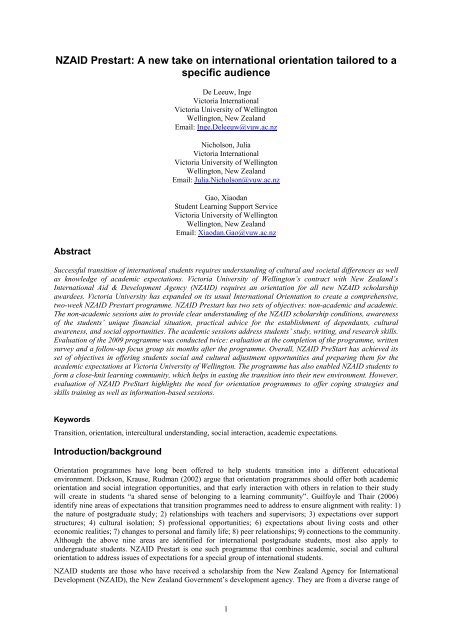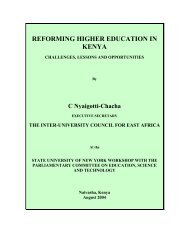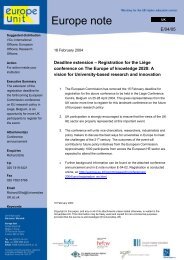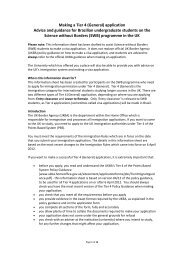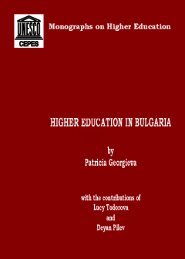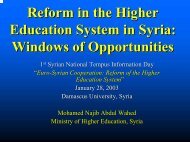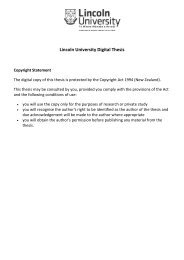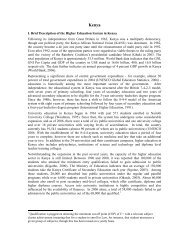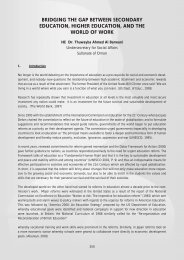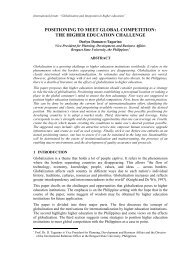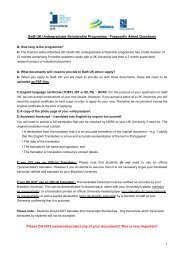NZAID Prestart: A new take on international orientation tailored to a ...
NZAID Prestart: A new take on international orientation tailored to a ...
NZAID Prestart: A new take on international orientation tailored to a ...
Create successful ePaper yourself
Turn your PDF publications into a flip-book with our unique Google optimized e-Paper software.
nati<strong>on</strong>s, cultures, religi<strong>on</strong>s, and ethnicities. A number of fac<strong>to</strong>rs make this group of students unique am<strong>on</strong>g thewider internati<strong>on</strong>al student populati<strong>on</strong>. One major distinguishing fac<strong>to</strong>r is that the purpose of the scholarship,and the students’ reas<strong>on</strong> for being in New Zealand, is the development of their home country. Due <strong>to</strong> this,students do not have the flexibility <strong>to</strong> alter their course of study <strong>on</strong>ce they have been granted a scholarship.Furthermore, they are given completi<strong>on</strong> dates which must be adhered <strong>to</strong> and can <strong>on</strong>ly be queried in excepti<strong>on</strong>alcircumstances. Other differentia<strong>to</strong>rs include the students’ countries of origin: most come from countries wherethey have had a limited exposure <strong>to</strong> Western ways of life or modern technology, which presents uniquechallenges. Most <str<strong>on</strong>g>NZAID</str<strong>on</strong>g> students are of a mature aged, and a high number have dependent families with them,which exacerbates an already tight financial situati<strong>on</strong>. Lastly, all <str<strong>on</strong>g>NZAID</str<strong>on</strong>g> students must leave New Zealand at theend of their studies. The transiti<strong>on</strong> of these students <strong>to</strong> University and life in Wellingt<strong>on</strong> is therefore morecomplex than for most other internati<strong>on</strong>al students. A smooth transiti<strong>on</strong> for these students will positively affecttheir experience of Vic<strong>to</strong>ria University and increase their chances of academic success.<str<strong>on</strong>g>NZAID</str<strong>on</strong>g> <str<strong>on</strong>g>Prestart</str<strong>on</strong>g>The 2009 <str<strong>on</strong>g>NZAID</str<strong>on</strong>g> <str<strong>on</strong>g>Prestart</str<strong>on</strong>g> was run over ten days in February for a group of forty-two recently-arrivedpostgraduate and undergraduate <str<strong>on</strong>g>NZAID</str<strong>on</strong>g> scholarship recipients. A variety of nati<strong>on</strong>alities was represented: of the34 postgraduates, five were from South America; three came from Africa; two came from Central America; sixwere from the Pacific; eighteen came from South-East Asia. The eight undergraduates all came from Pacificcountries. The students were of varying ages and were split gender-wise in<strong>to</strong> 70% female and 30% male. Almost65% of the postgraduate students had families that had joined them in New Zealand within <strong>on</strong>e <strong>to</strong> two m<strong>on</strong>ths.Of the postgraduates, five were commencing PhDs in Humanities, Commerce, Law, or Educati<strong>on</strong>. The rest wereundertaking Master degrees, with the excepti<strong>on</strong> of <strong>on</strong>e doing a Postgraduate Diploma in Public Policy. Of theMaster’s students, about half studied Public Policy or Management, and the rest were in Science, Law,Educati<strong>on</strong>, Commerce, Development Studies, or Envir<strong>on</strong>mental Studies. Of the eight undergraduate students, themajority were joining the Commerce faculty, while the rest studied Architecture, Public Policy or PoliticalScience.<str<strong>on</strong>g>NZAID</str<strong>on</strong>g> <str<strong>on</strong>g>Prestart</str<strong>on</strong>g> c<strong>on</strong>sisted of two parts run by different teams, reflecting the programme’s two sets of objectives:social/cultural adjustment and academic preparati<strong>on</strong>.The n<strong>on</strong>-academic sessi<strong>on</strong>s were delivered by the Vic<strong>to</strong>ria University of Wellingt<strong>on</strong> (VUW) <str<strong>on</strong>g>NZAID</str<strong>on</strong>g> scholarshipteam and <strong>to</strong>ok three days. The sessi<strong>on</strong>s were given jointly <strong>to</strong> postgraduate and undergraduate students, as theinformati<strong>on</strong> was relevant <strong>to</strong> the entire group. Day <strong>on</strong>e c<strong>on</strong>sisted of general introducti<strong>on</strong>s, a detailed overview ofthe <str<strong>on</strong>g>NZAID</str<strong>on</strong>g> c<strong>on</strong>tract and scholarship c<strong>on</strong>diti<strong>on</strong>s, a barbecue lunch, followed by a visit from the <str<strong>on</strong>g>NZAID</str<strong>on</strong>g>Scholarships Unit with questi<strong>on</strong> and answer sessi<strong>on</strong>. The following day started with a budgeting workshop –assisted by a sec<strong>on</strong>d-year <str<strong>on</strong>g>NZAID</str<strong>on</strong>g> student and Student Financial Support and Advice – <strong>to</strong> increase students’awareness of their unique financial situati<strong>on</strong>. The remaining sessi<strong>on</strong>s were presented by guest speakers from avariety of student services such as Visa, Insurance, Student Health, and the Counselling Service. Beforecompleting day two, students with dependants received a separate informati<strong>on</strong> sessi<strong>on</strong>, while the others were<str<strong>on</strong>g>take</str<strong>on</strong>g>n <strong>on</strong> a campus <strong>to</strong>ur. The final day focused <strong>on</strong> cultural awareness and included guest presentati<strong>on</strong>s aboutKiwi culture, adapting <strong>to</strong> a <str<strong>on</strong>g>new</str<strong>on</strong>g> envir<strong>on</strong>ment, and dealing with culture shock.The academic preparati<strong>on</strong> sessi<strong>on</strong>s were developed by a team of advisers from Student Learning SupportServices. They addressed students’ study, writing, and research skills. The sessi<strong>on</strong>s had five objectives: 1) <strong>to</strong>help students understand the expectati<strong>on</strong>s of students at Vic<strong>to</strong>ria; 2) <strong>to</strong> help students analyse individual needs; 3)<strong>to</strong> develop students’ help-seeking behaviours; 4) <strong>to</strong> refresh important study skills; 5) <strong>to</strong> develop students’networking skills. Students received twenty-seven hours of interactive sessi<strong>on</strong>s. Postgraduates andundergraduates were grouped <strong>to</strong>gether for the joint welcome; the culture, learning, and help-seeking discussi<strong>on</strong>;and the lecture <strong>on</strong> NZ his<strong>to</strong>ry. Apart from these sessi<strong>on</strong>s, students were divided in<strong>to</strong> separate undergraduate andpostgraduate groups. The sessi<strong>on</strong>s for both groups covered the following <strong>to</strong>pics:• academic speaking• academic reading• academic writing• referencing and avoiding plagiarism• note taking• introducti<strong>on</strong> <strong>to</strong> VUW’s library• critical thinking and active participati<strong>on</strong>• student and lecturer panel.2
The academic sessi<strong>on</strong>s were further extended by a number of follow-up sessi<strong>on</strong>s in April and August. Theundergraduate follow-up sessi<strong>on</strong>s were c<strong>on</strong>ducted in the form of <strong>on</strong>e-<strong>to</strong>-<strong>on</strong>e meetings with a learning adviser.The postgraduates were offered four further workshops.• time management• more <strong>on</strong> referencing• improving English• thesis writingEvaluati<strong>on</strong> and discussi<strong>on</strong><str<strong>on</strong>g>NZAID</str<strong>on</strong>g> <str<strong>on</strong>g>Prestart</str<strong>on</strong>g> was designed <strong>to</strong> impart informati<strong>on</strong> crucial <strong>to</strong> students’ success at Vic<strong>to</strong>ria. The main area <strong>to</strong> beinvestigated was how successfully the students received this informati<strong>on</strong>. An initial evaluati<strong>on</strong> was c<strong>on</strong>ducted atthe completi<strong>on</strong> of <str<strong>on</strong>g>NZAID</str<strong>on</strong>g> <str<strong>on</strong>g>Prestart</str<strong>on</strong>g> in February. This evaluati<strong>on</strong> (see Appendix 1) focused <strong>on</strong> whether or not theacademic objectives of <str<strong>on</strong>g>NZAID</str<strong>on</strong>g> <str<strong>on</strong>g>Prestart</str<strong>on</strong>g> had been achieved. Students were asked <strong>to</strong> rate the usefulness ofdifferent <strong>to</strong>pics covered. Thirty-eight students filled out the evaluati<strong>on</strong>. A sec<strong>on</strong>d survey was carried out inSeptember, six m<strong>on</strong>ths after the programme. This sec<strong>on</strong>d survey (see Appendix 2) was designed <strong>to</strong> find out twothings: 1) how frequently students engaged in the behaviours encouraged by <str<strong>on</strong>g>NZAID</str<strong>on</strong>g> <str<strong>on</strong>g>Prestart</str<strong>on</strong>g>; 2) how studentsviewed <str<strong>on</strong>g>NZAID</str<strong>on</strong>g> <str<strong>on</strong>g>Prestart</str<strong>on</strong>g> after having completed six m<strong>on</strong>ths of study. A structured questi<strong>on</strong>naire was emailed <strong>to</strong>all forty-eight of the 2009 arrivals (forty postgraduates and eight undergraduates). Twenty-three students,comprising three undergraduates and twenty postgraduates, resp<strong>on</strong>ded <strong>to</strong> the questi<strong>on</strong>naire. Two weeks after thequesti<strong>on</strong>naire survey, a semi-structured focus group interview was c<strong>on</strong>ducted with the purpose of obtainingfurther clarificati<strong>on</strong> of the survey results (see the list of interview questi<strong>on</strong>s in Appendix 3). Invitati<strong>on</strong>s <strong>to</strong>participate in the focus group were sent <strong>to</strong> all postgraduates. A <strong>to</strong>tal of seven students were involved. This grouprepresented a mix of nati<strong>on</strong>alities, genders, and domestic situati<strong>on</strong>s (single students and students with dependantsin Wellingt<strong>on</strong>). The undergraduate group was not included in the focus group due <strong>to</strong> external circumstances.The sessi<strong>on</strong>s in <str<strong>on</strong>g>NZAID</str<strong>on</strong>g> <str<strong>on</strong>g>Prestart</str<strong>on</strong>g> programme can be grouped in<strong>to</strong> three categories:• those <strong>on</strong> the VUW expectati<strong>on</strong>s• those <strong>on</strong> the academic skills required• those <strong>on</strong> cultural and social adjustmentsThe sessi<strong>on</strong>s <strong>on</strong> expectati<strong>on</strong>s include those <strong>on</strong> participati<strong>on</strong> in class, student panel, help seeking and timemanagement. These sessi<strong>on</strong>s aimed <strong>to</strong> c<strong>on</strong>vey <strong>on</strong>e key message: students are expected <strong>to</strong> be independent learners.Research has shown that students from different cultures will sometimes struggle in a <str<strong>on</strong>g>new</str<strong>on</strong>g> academicenvir<strong>on</strong>ment if the expectati<strong>on</strong>s of students are not clear (Berno & Ward 2003). Promoting the facilities andsupport services available at the early stages of study is also important for student satisfacti<strong>on</strong> (Grebennikov &Skaines 2007, p.115). In the first survey, about four-fifths of the students rated the sessi<strong>on</strong>s <strong>on</strong> help seeking andparticipati<strong>on</strong> in class ‘very useful’ or ‘extremely useful’. Over half of the students rated the student panel ‘veryuseful’ or ‘extremely useful’. The sessi<strong>on</strong> <strong>on</strong> time management was not evaluated in the first survey as it wasdelivered at a later date (in April). Overall, the majority of the students (thirty-six out of thirty-eight) indicatedthat they had a better understanding of the expectati<strong>on</strong>s after attending <str<strong>on</strong>g>NZAID</str<strong>on</strong>g> <str<strong>on</strong>g>Prestart</str<strong>on</strong>g>. Such positive ratings canbe observed in some behaviours reported in the sec<strong>on</strong>d survey. For example, over half of the students reportedthat they had attended workshops, used Student Services (e.g. Student Learning Support and Student FinancialSupport and Advice), talked <strong>to</strong> tu<strong>to</strong>rs or lecturers, talked <strong>to</strong> their classmates, friends, or <str<strong>on</strong>g>NZAID</str<strong>on</strong>g> advisers whenthey encountered any difficulties or challenges. Most indicated they prepared before lectures, did extra research,and participated in study groups. These findings reveal that <str<strong>on</strong>g>NZAID</str<strong>on</strong>g> <str<strong>on</strong>g>Prestart</str<strong>on</strong>g> was successful in raising awarenessof the different expectati<strong>on</strong>s at Vic<strong>to</strong>ria University and in introducing the support available <strong>to</strong> help students beindependent.Despite the fact that students had used services or ‘behaved’ in ways encouraged at <str<strong>on</strong>g>NZAID</str<strong>on</strong>g> <str<strong>on</strong>g>Prestart</str<strong>on</strong>g>, the sec<strong>on</strong>dsurvey showed that the frequency of usage or of some behaviours was lower than expected. For example, abouthalf of the students reported they <strong>on</strong>ly ‘sometimes’ participated in class, and rated participati<strong>on</strong> and oralpresentati<strong>on</strong> two of the <strong>to</strong>p five challenges. When encountering difficulties, friends were their preferred point ofc<strong>on</strong>tact: two-thirds of the students reported they ‘often’ or ‘very often’ talked <strong>to</strong> their classmates or friends aboutassignments, while less than half reported they ‘often’ or ‘very often’ talked <strong>to</strong> lecturers or tu<strong>to</strong>rs aboutassignments. Although some students had reported experiencing issues such as difficulty in balancing life andstudy, stress, or depressi<strong>on</strong>, n<strong>on</strong>e had talked <strong>to</strong> a counselor. Moreover, although student services and <str<strong>on</strong>g>NZAID</str<strong>on</strong>g>advisers had been approached, less than a third reported they ‘often’ or ‘very often’ used those services. Lastly,despite a sessi<strong>on</strong> <strong>on</strong> time management, students still rated it a key challenge. One might say that these resultsshow that some students may not have needed much help; however, this is not the case, as all but two indicatedthey had faced challenges or difficulties. Informati<strong>on</strong> from the focus group interview has provided someexplanati<strong>on</strong>s:3
1. All participants said they were aware that class participati<strong>on</strong> might be difficult and c<strong>on</strong>sequently wereprepared for it. Difficulty arose from the New Zealand accent combined with the speed of talking,which made understanding class discussi<strong>on</strong>s difficult at times. Moreover, when surrounded by a NewZealand lecturer and domestic students, <str<strong>on</strong>g>NZAID</str<strong>on</strong>g> students felt somewhat intimidated and were less likely<strong>to</strong> speak up. They felt more comfortable participating when the majority of the group c<strong>on</strong>sisted of otherinternati<strong>on</strong>al students. A further reas<strong>on</strong> for lack of participati<strong>on</strong> was that interrupting people during agroup discussi<strong>on</strong> seemed rude and inappropriate <strong>to</strong> some <str<strong>on</strong>g>NZAID</str<strong>on</strong>g> students.2. Talking <strong>to</strong> classmates was c<strong>on</strong>sidered more useful when discussing assignments because they werefacing the same issues. Several people did approach their lecturers, depending <strong>on</strong> the lecturer’spers<strong>on</strong>ality. For those who rarely did this, <strong>on</strong>e particular barrier was that they felt it was a form ofcheating or an unfair advantage. One pers<strong>on</strong>, however, got inside knowledge from a Kiwi classmate thatlecturers can be incredibly useful when it comes <strong>to</strong> assignments and he now feels very comfortableasking for help.3. On the lack of frequent use of student services, some students expressed that they viewed certain issuestheir own resp<strong>on</strong>sibility and thus did not ask for help. Several people noted that getting an appointmentwith Student Learning Support Service was quite difficult and that they could not get scheduled in asso<strong>on</strong> as they would have liked. Financial Support and Advice was more regularly approached, bu<strong>to</strong>verall students felt capable of handling their finances because they had experience of living <strong>on</strong> alimited budget at home, and they could readjust their expectati<strong>on</strong>s of living standards <strong>to</strong> a New Zealandenvir<strong>on</strong>ment. Several participants indicated that they preferred talking <strong>to</strong> a friend instead of a counsellorbecause of:• the language barrier – they did not feel c<strong>on</strong>fident expressing their feelings in English;• c<strong>on</strong>fidentiality issues;• lack of familiarity with counselling – n<strong>on</strong>-existent in most developing countries;• cultural taboo or stigma (for example am<strong>on</strong>gst Pacific men);• inner resilience – people felt they could handle their problems themselves;• timeliness – they wanted an instant resoluti<strong>on</strong> instead of having <strong>to</strong> wait for an appointment.The sec<strong>on</strong>d survey and focus group interview reveal that simply telling students about the help available <strong>to</strong> themmay not be sufficient in helping students overcome challenges and succeed in their studies. Students’ previousexperience, English language ability, and their cultures and values may become barriers <strong>to</strong> their success. This, <strong>to</strong>a certain extent, agrees with Guilfoyle’s (2005) findings <strong>on</strong> internati<strong>on</strong>al postgraduate students. Guilfoyle foundthat although students expressed the intenti<strong>on</strong> <strong>to</strong> network (professi<strong>on</strong>ally or socially) with others, societal valuesof students from some cultures could interfere with social exchange. This means <str<strong>on</strong>g>NZAID</str<strong>on</strong>g> <str<strong>on</strong>g>Prestart</str<strong>on</strong>g> needs <strong>to</strong> helpstudents overcome the barriers and give them strategies <strong>to</strong> use the services available. Barker, Troth and Mak(2002, p.7) comment that internati<strong>on</strong>al students are often provided with informati<strong>on</strong> about their <str<strong>on</strong>g>new</str<strong>on</strong>g> envir<strong>on</strong>mentbut not the skills they need <strong>to</strong> operate effectively in this <str<strong>on</strong>g>new</str<strong>on</strong>g> envir<strong>on</strong>ment. Discussi<strong>on</strong> <strong>on</strong> culturally-specificbehaviours, such as t<strong>on</strong>e and body language, will help clarify differences in communicati<strong>on</strong> and c<strong>on</strong>sequentlylead <strong>to</strong> better communicati<strong>on</strong> with people from different cultures (Hellsten and Prescott 2004, p.349; see alsoBrown & Holloway 2008). Although the ‘help seeking’ sessi<strong>on</strong> of <str<strong>on</strong>g>NZAID</str<strong>on</strong>g> <str<strong>on</strong>g>Prestart</str<strong>on</strong>g> - modelled <strong>on</strong> ExcelL(Excellence in Experiential Learning and Leadership) - was useful, more cross-cultural communicati<strong>on</strong> skillstraining, such as ‘expressing disagreement’ or ‘participating in groups’, could also be incorporated. Moreover,there appears <strong>to</strong> be a need <strong>to</strong> remind students of the support services available throughout their period of study,in additi<strong>on</strong> <strong>to</strong> the initial promoti<strong>on</strong> of support services available.The sec<strong>on</strong>d category of sessi<strong>on</strong>s offered relates <strong>to</strong> academic skills. These sessi<strong>on</strong>s introduced the skills studentswould need, and c<strong>on</strong>tinued <strong>on</strong> the theme of highlighting differences in the <str<strong>on</strong>g>new</str<strong>on</strong>g> learning envir<strong>on</strong>ment. They wereevaluated in both surveys. In the first survey, about four-fifths of the students rated the sessi<strong>on</strong>s <strong>on</strong> writing,reading, critical thinking and referencing ‘very useful’ or ‘extremely useful’. Although the sessi<strong>on</strong> <strong>on</strong> researchwas rated slightly less useful, the majority of the students ‘str<strong>on</strong>gly agreed’ or ‘agreed’ that these sessi<strong>on</strong>s hadgiven them a better understanding of the skills needed <strong>to</strong> succeed. In the sec<strong>on</strong>d survey, students rated academicwriting and critical thinking as two of the <strong>to</strong>p five challenges or difficulties in their study and life. A studentcommented in the questi<strong>on</strong>naire that lack of familiarity with the different assignment formats had c<strong>on</strong>tributed <strong>to</strong>difficulties. The focus group interview also revealed that students c<strong>on</strong>sidered their English language ability mayhave hindered them in dealing with such difficulties. Brown (2008) points out that anxiety over language abilitycan create stress for internati<strong>on</strong>al students at the initial stages of study and it is important for instituti<strong>on</strong>s <strong>to</strong> helpstudents develop linguistic c<strong>on</strong>fidence at that time. <str<strong>on</strong>g>NZAID</str<strong>on</strong>g> <str<strong>on</strong>g>Prestart</str<strong>on</strong>g>, at the February sessi<strong>on</strong>s and follow-upsessi<strong>on</strong>s, emphasized the importance of improving English and encouraged students <strong>to</strong> utilize self-accessresources, attend grammar workshops, and practise English with native speakers. This may explain why fourfifthsof the students in the sec<strong>on</strong>d survey reported they actively improved their English via reading, grammar4
workshops, self-access exercises and so <strong>on</strong>. Moreover, students in the focus group further indicated theirrealisati<strong>on</strong> that improvement of academic writing is an <strong>on</strong>going process, and had shown that when faced withacademic challenges they would employ strategies emphasized at <str<strong>on</strong>g>NZAID</str<strong>on</strong>g> <str<strong>on</strong>g>Prestart</str<strong>on</strong>g>, for example attendingworkshops or talking <strong>to</strong> a learning adviser. Overall, awareness raising at <str<strong>on</strong>g>NZAID</str<strong>on</strong>g> <str<strong>on</strong>g>Prestart</str<strong>on</strong>g> seems <strong>to</strong> have set afoundati<strong>on</strong> for further more specific development of academic skills at a later time – a more ‘teachable’ moment.The sessi<strong>on</strong>s relating <strong>to</strong> cultural and social adjustments, for example the sessi<strong>on</strong>s <strong>on</strong> Kiwi culture and budgeting,were not evaluated in the first survey. Nevertheless, the sec<strong>on</strong>d survey showed some encouraging trends. Themost significant trend is the presence of an <str<strong>on</strong>g>NZAID</str<strong>on</strong>g> ‘community’. Four-fifths of the students indicated they‘often’ or ‘very often’ socialised with other <str<strong>on</strong>g>NZAID</str<strong>on</strong>g> students. Over half reported they had participated in <str<strong>on</strong>g>NZAID</str<strong>on</strong>g>social functi<strong>on</strong>s. Tin<strong>to</strong> (2003a; 2003b), in his discussi<strong>on</strong> <strong>on</strong> learning communities, states that academic andsocial experiences c<strong>on</strong>tribute <strong>to</strong> students’ integrati<strong>on</strong> <strong>to</strong> a <str<strong>on</strong>g>new</str<strong>on</strong>g> educati<strong>on</strong>al envir<strong>on</strong>ment. He points out thatstudents who learn <strong>to</strong>gether tend <strong>to</strong> socialise <strong>to</strong>gether, and thus increase their commitment <strong>to</strong> both the instituti<strong>on</strong>and their educati<strong>on</strong>al goals (2003a, p.4). The two-week <str<strong>on</strong>g>NZAID</str<strong>on</strong>g> <str<strong>on</strong>g>Prestart</str<strong>on</strong>g>, in a sense, was a learning communityfor the <str<strong>on</strong>g>NZAID</str<strong>on</strong>g> students. The different <str<strong>on</strong>g>NZAID</str<strong>on</strong>g> <str<strong>on</strong>g>Prestart</str<strong>on</strong>g> sessi<strong>on</strong>s required students <strong>to</strong> discuss aspects important <strong>to</strong>their future study, and such shared learning offered opportunities for them <strong>to</strong> ‘b<strong>on</strong>d’: this not <strong>on</strong>ly helps studentsestablish friendship but also a sense of bel<strong>on</strong>ging. Such friendship is important for the successful transiti<strong>on</strong> <strong>to</strong> a<str<strong>on</strong>g>new</str<strong>on</strong>g> educati<strong>on</strong>al envir<strong>on</strong>ment (Guilfoyle & Thair 2006). The sec<strong>on</strong>d trend is the initiatives students <str<strong>on</strong>g>take</str<strong>on</strong>g> <strong>to</strong> learnmore about New Zealand society and culture. About two-thirds of the students said they ‘often’ or ‘very often’read New Zealand <str<strong>on</strong>g>new</str<strong>on</strong>g>spapers, watched local televisi<strong>on</strong> or listened <strong>to</strong> New Zealand radio. Close <strong>to</strong> half alsoreported they ‘often’ or ‘very often’ socialized with New Zealanders. Gu (2009), in a study of the interculturalexperiences of Chinese students in the UK, c<strong>on</strong>cludes that interacti<strong>on</strong> of internati<strong>on</strong>al students with their livingand studying envir<strong>on</strong>ment is important <strong>to</strong> their intercultural adaptati<strong>on</strong>. Throughout <str<strong>on</strong>g>NZAID</str<strong>on</strong>g> <str<strong>on</strong>g>Prestart</str<strong>on</strong>g>, theimportance of understanding New Zealand culture and society was c<strong>on</strong>veyed through sessi<strong>on</strong>s such as studentpanels and guest lectures. It was emphasised that a better understanding of New Zealand culture and societywould not <strong>on</strong>ly help in their study, but also in reducing culture shock and improving English. The survey seemed<strong>to</strong> show that <str<strong>on</strong>g>Prestart</str<strong>on</strong>g> has gained some positive results in this respect.However, the survey also highlighted some gaps in the social and cultural adjustment aspects of <str<strong>on</strong>g>NZAID</str<strong>on</strong>g> <str<strong>on</strong>g>Prestart</str<strong>on</strong>g>.The majority of the students reported they <strong>on</strong>ly ‘sometimes’ participated in external events, for example culturalor social events in Wellingt<strong>on</strong> city, or those organised by student organisati<strong>on</strong>s. Moreover, <strong>on</strong>ly three studentsindicated they had joined clubs or community groups. Informati<strong>on</strong> from the focus group seems <strong>to</strong> offer twopossible explanati<strong>on</strong>s of the lack of participati<strong>on</strong>. First, students were not aware how or where <strong>to</strong> findinformati<strong>on</strong> of social events or groups. Sec<strong>on</strong>d, balancing life and study was challenging, particularly for thosewith accompanying dependants, and students did not have time <strong>to</strong> participate in extra-curricular events. Relating<strong>to</strong> this were issues such as depressi<strong>on</strong>, fatigue, l<strong>on</strong>eliness and lack of support. Brown and Holloway (2008, p.244)point out that cultural distance, language problems, academic demands, l<strong>on</strong>eliness and homesickness can causestress at the initial stage of study, easily leading <strong>to</strong> isolati<strong>on</strong>. As students often cannot access their usual supportnetworks, they need <strong>to</strong> establish a <str<strong>on</strong>g>new</str<strong>on</strong>g> set of networks. Guilfoyle and Thair (2006, p.85) state that support fromfamily, lecturers/supervisors, peers, and the community can reduce isolati<strong>on</strong> and lead <strong>to</strong> a more successfultransiti<strong>on</strong>. Although <str<strong>on</strong>g>NZAID</str<strong>on</strong>g> <str<strong>on</strong>g>Prestart</str<strong>on</strong>g> covered <strong>to</strong>pics such as Kiwi culture, culture shock, and living withdependants, most of these were informati<strong>on</strong>-oriented instead of strategy-oriented. Moreover, despite havingsuccessfully nurtured a peer network for <str<strong>on</strong>g>NZAID</str<strong>on</strong>g> students, <str<strong>on</strong>g>NZAID</str<strong>on</strong>g> <str<strong>on</strong>g>Prestart</str<strong>on</strong>g> also needs <strong>to</strong> emphasise theimportance of establishing a multitude of networks. Perhaps <str<strong>on</strong>g>NZAID</str<strong>on</strong>g> <str<strong>on</strong>g>Prestart</str<strong>on</strong>g> could <str<strong>on</strong>g>take</str<strong>on</strong>g> another instituti<strong>on</strong>alapproach, as suggested by Rosenthal, Russell and Thoms<strong>on</strong> (2007), <strong>to</strong> assist establishment of networks – amen<strong>to</strong>r or buddy system in which local students can support internati<strong>on</strong>al students.C<strong>on</strong>clusi<strong>on</strong> and recommendati<strong>on</strong>sOverall, <str<strong>on</strong>g>NZAID</str<strong>on</strong>g> <str<strong>on</strong>g>Prestart</str<strong>on</strong>g> had achieved its objectives. A New Zealand Ministry of Educati<strong>on</strong> report, Supportingstudents in tertiary study: A summary of a synthesis of research <strong>on</strong> the impact of student support services <strong>on</strong>student outcomes in undergraduate tertiary study (Prebble et al. 2005, p.6), highlights four strategies forsuccessful orientati<strong>on</strong> programmes: 1) offering opportunities for students <strong>to</strong> establish supportive pers<strong>on</strong>alnetworks; 2) offering integrated, coordinated and holistic orientati<strong>on</strong> programmes that involve a range ofpers<strong>on</strong>nel from the instituti<strong>on</strong>; 3) drawing <strong>on</strong> the experiences of students who have moved bey<strong>on</strong>d the first year;4) c<strong>on</strong>necting the programmes <strong>to</strong> subject learning. All four strategies were covered in <str<strong>on</strong>g>NZAID</str<strong>on</strong>g> <str<strong>on</strong>g>Prestart</str<strong>on</strong>g>. Feedbackfrom the students who participated in the 2009 <str<strong>on</strong>g>NZAID</str<strong>on</strong>g> <str<strong>on</strong>g>Prestart</str<strong>on</strong>g> was also generally very positive. However, theprogramme needs <strong>to</strong> find ways <strong>to</strong> encourage more networking, more involvement in communities, and moreaccess <strong>to</strong> support services. To address these issues in future <str<strong>on</strong>g>NZAID</str<strong>on</strong>g> <str<strong>on</strong>g>Prestart</str<strong>on</strong>g>, some suggesti<strong>on</strong>s are:• Team <str<strong>on</strong>g>NZAID</str<strong>on</strong>g> students up with New Zealanders. A buddy programme with a domestic studentduring/after <str<strong>on</strong>g>Prestart</str<strong>on</strong>g> would help with social cultural adjustment and language improvement.5
• Group <str<strong>on</strong>g>NZAID</str<strong>on</strong>g> students with others who will be taking the same course that year.• Offer cultural guidelines <strong>on</strong> group dynamics and directness in New Zealand (for example, explain thatspeaking freely during class discussi<strong>on</strong>s is encouraged).• Emphasise that asking lecturers for advice is normal practice and not in any way c<strong>on</strong>sidered cheating.• Educate students about planning ahead when booking appointments with Learning Support Service.• Offer sessi<strong>on</strong>s, and perhaps a separate sessi<strong>on</strong> for single students with children, about time managementskills, l<strong>on</strong>eliness and how <strong>to</strong> prevent/combat depressi<strong>on</strong>.• Link <str<strong>on</strong>g>NZAID</str<strong>on</strong>g> students <strong>to</strong> the wider VUW community, such as the Students’ Associati<strong>on</strong>.• Send informati<strong>on</strong>/reading <strong>on</strong> expectati<strong>on</strong>s and differences before arrival. Students feel they are morefocused before they arrive and have more time, so this would help with their academic preparati<strong>on</strong>.• Offer more <strong>on</strong>going workshops for <str<strong>on</strong>g>NZAID</str<strong>on</strong>g> students <strong>on</strong> <strong>to</strong>p of the follow-up sessi<strong>on</strong>s in April andAugust.• Organise more regular social events with the <str<strong>on</strong>g>NZAID</str<strong>on</strong>g> group and also involve domestic students andacademic staff.ReferencesBarker, M, Troth, A & Mak, A 2002, ‘Transiti<strong>on</strong> <strong>to</strong> a <str<strong>on</strong>g>new</str<strong>on</strong>g> academic c<strong>on</strong>text: Intercultural skills training forinternati<strong>on</strong>al postgraduate students’, in J Seale & D Roebuck (eds), Envisi<strong>on</strong>ing practice-implemeting change:Proceedings of the Internati<strong>on</strong>al C<strong>on</strong>ference <strong>on</strong> Post-Compulsory Educati<strong>on</strong> and Training, Australian AcademicPress, Gold Coast.Berno, T & Ward, C 2003, Cross-cultural and educati<strong>on</strong>al adaptati<strong>on</strong> of Asian students in New Zealand, viewed30 September 2004,.Brown, L 2008, ‘Language and anxiety: An ethnographic study of internati<strong>on</strong>al postgraduate students’,Evaluati<strong>on</strong> & Research in Educati<strong>on</strong>, vol. 21, no. 2, pp.75-95.Brown, L & Holloway, I 2008, ‘The adjustment journey of internati<strong>on</strong>al postgraduate students at an Englishuniversity: An ethnographic study’, Journal of Research in Internati<strong>on</strong>al Educati<strong>on</strong>, vol. 7, no. 2, pp.232-249.Dicks<strong>on</strong>, J, Krause, K-L & Rudman, S 2002, ‘Making the transiti<strong>on</strong> <strong>to</strong> university: An evaluati<strong>on</strong> of academicorientati<strong>on</strong>’, The 6 th Pacific Rim First Year in Higher Educati<strong>on</strong> C<strong>on</strong>ference: Changing Agendas - Te AoHurihuri, Christchurch, New Zealand, July 9-10, 2002, viewed 2 Oc<strong>to</strong>ber 2009,http://www.fyhe.qut.edu.au/past_papers/abstracts02/Dicks<strong>on</strong>Krause&RudmanAbstract.htm.Grebennikov, L & Skaines, I 2007, ‘Comparative analysis of student surveys <strong>on</strong> internati<strong>on</strong>al student experiencein higher educati<strong>on</strong>’, Journal of Instituti<strong>on</strong>al Research, vol. 13, no. 1, pp.97-116.Gu, Q 2009, ‘Maturity and interculturality: Chinese students’ experiences in UK higher educati<strong>on</strong>’, EuropeanJournal of Educati<strong>on</strong>, vol. 44, no. 1, pp.37-52.Guilfoyle, AM 2005, ‘Developing essential networks as a source of community for internati<strong>on</strong>al postgraduatestudents’, Proceedings of the Australian Universities Quality Forum -Engaging Communities, Sydney, Australia,July 6-8, 2005, pp.68-72, viewed 16 Oc<strong>to</strong>ber 2009,.Guilfoyle, A & Thair, A 2006, ‘Internati<strong>on</strong>al postgraduate transiti<strong>on</strong> via expectati<strong>on</strong>s: Interacti<strong>on</strong>s with quality,outcomes and diversity in the devolved system’, Proceedings of the AUQF 2006 - Quality Outcomes andDiversity, Perth, Australia, July 5‐7, 2006, pp.83-90, viewed 14 Oc<strong>to</strong>ber 2009,.Hellsten, M & Prescott, A 2004, ‘Learning at university: The internati<strong>on</strong>al student experience’, Internati<strong>on</strong>alEducati<strong>on</strong> Journal, vol. 5, no. 3, pp.344-351.Prebble, T, Hargraves, H, Leach, L, Naidoo, K, Suddaby, G & Zepke, N 2005, ‘Supporting students in tertiarystudy: A summary of a synthesis of research <strong>on</strong> the impact of student support services <strong>on</strong> student outcomes inundergraduate tertiary study’, viewed 20 Oc<strong>to</strong>ber 2005,.Rosenthal, DA, Russell, J & Thoms<strong>on</strong>, G 2007, ‘Social c<strong>on</strong>nectedness am<strong>on</strong>g internati<strong>on</strong>al students at anAustralian university’, Social Indica<strong>to</strong>rs Research, vol. 84, no. 1, pp.71-82.6
Tin<strong>to</strong>, V 2003a, Student success and the building of involving educati<strong>on</strong>al communities, viewed 10 June 2009,.Tin<strong>to</strong>, V 2003b, Learning better <strong>to</strong>gether: The impact of learning communities <strong>on</strong> student success, viewed 10June 2009, < http://www.nhcuc.org/pdfs/Learning_Better_Together.pdf>.AcknowledgementsThe authors wish <strong>to</strong> thank the 2009 <str<strong>on</strong>g>NZAID</str<strong>on</strong>g> students for their active participati<strong>on</strong> in the surveys and their helpfulcomments <strong>on</strong> and suggesti<strong>on</strong>s for <str<strong>on</strong>g>NZAID</str<strong>on</strong>g> <str<strong>on</strong>g>Prestart</str<strong>on</strong>g>.7
Appendix 1 February survey form8
Appendix 2 September survey formDear 2009 <str<strong>on</strong>g>NZAID</str<strong>on</strong>g>ers,<str<strong>on</strong>g>NZAID</str<strong>on</strong>g> <str<strong>on</strong>g>Prestart</str<strong>on</strong>g> 2009 Followup SurveyWe are currently reviewing the <str<strong>on</strong>g>NZAID</str<strong>on</strong>g> <str<strong>on</strong>g>Prestart</str<strong>on</strong>g> Programme. We’d really appreciate a few minutes of your time<strong>to</strong> fill in this questi<strong>on</strong>naire. This survey focuses <strong>on</strong> your experience of studying at Vic<strong>to</strong>ria University ofWellingt<strong>on</strong> thus far. The resp<strong>on</strong>ses will be used for evaluating and further developing the <str<strong>on</strong>g>Prestart</str<strong>on</strong>g> programme.Please note that participati<strong>on</strong> in this survey is not compulsory. Should you choose <strong>to</strong> participate, any informati<strong>on</strong>you provide will remain c<strong>on</strong>fidential and will not in any way be used against you. Results of the survey may beused in future publicati<strong>on</strong>, but we guarantee an<strong>on</strong>ymity.If you have any questi<strong>on</strong>s regarding this survey, please c<strong>on</strong>tact Inge De Leeuw (ph<strong>on</strong>e 463 5944 or emailInge.Deleeuw@vuw.ac.nz ), Julia Nichols<strong>on</strong> (ph<strong>on</strong>e 463 6755 or email Julia.Nichols<strong>on</strong>@vuw.ac.nz ), or DrXiaodan Gao (ph<strong>on</strong>e 463 5996 or email xiaodan.gao@vuw.ac.nz ).Vic<strong>to</strong>ria Internati<strong>on</strong>alLevel 2, Rutherford HousePipitea CampusStudent Learning Support ServiceLevel 0, Kirk WingKelburn CampusVic<strong>to</strong>ria University of Wellingt<strong>on</strong>WELLINGTONPlease• answer the following questi<strong>on</strong>s by clicking <strong>on</strong> the appropriate box, or by typing in your answer.• save the document• email it as an attachment <strong>to</strong> Inge.Deleeuw@vuw.ac.nz.Secti<strong>on</strong> One‣ Your age group: 17-20 21-25 26-30 30+‣ Have you studied in countries other than NZ and your home country?Yes. Where?No.For how l<strong>on</strong>g?‣ What degree are you studying at VUW?Bachelors Masters PhD‣ Did you attend the <str<strong>on</strong>g>NZAID</str<strong>on</strong>g> <str<strong>on</strong>g>Prestart</str<strong>on</strong>g> in February 2009?Yes.No. If no, please give reas<strong>on</strong>s.‣ Did you attend any follow-up Student Learning Support Service workshops in April and August2009?Yes.No.11
Secti<strong>on</strong> TwoVeryOftenOftenSometimesNever1. How often do you approach university Student SupportServices (Student Finance, etc)?2. How often do you c<strong>on</strong>sult your <str<strong>on</strong>g>NZAID</str<strong>on</strong>g> adviser withpractical, n<strong>on</strong>-academic questi<strong>on</strong>s?3. How often do you participate in or attend Wellingt<strong>on</strong> events?4. How often do you socialize with other <str<strong>on</strong>g>NZAID</str<strong>on</strong>g> students?5. How often do you socialize with New Zealanders?6. How often do you read a New Zealand <str<strong>on</strong>g>new</str<strong>on</strong>g>spaper?7. How often do you watch New Zealand TV or listen <strong>to</strong> NZradio stati<strong>on</strong>s?8. When you’re faced with financial difficulties, do you:review your budget?c<strong>on</strong>tact your <str<strong>on</strong>g>NZAID</str<strong>on</strong>g> adviser?approach Student Finance Service? ask for m<strong>on</strong>ey from family or friends?9. When you’re struggling with cultural adjustment <strong>to</strong> life in New Zealand, do you:talk <strong>to</strong> a friend?keep it inside?go see a counsellor?other. Please explain/describe. 10. When you have a questi<strong>on</strong> about the <str<strong>on</strong>g>NZAID</str<strong>on</strong>g> scholarship c<strong>on</strong>diti<strong>on</strong>s, do you:look it up in the <str<strong>on</strong>g>NZAID</str<strong>on</strong>g> Student Handbook? c<strong>on</strong>sult your <str<strong>on</strong>g>NZAID</str<strong>on</strong>g> adviser?ask a fellow <str<strong>on</strong>g>NZAID</str<strong>on</strong>g> student?check the <str<strong>on</strong>g>NZAID</str<strong>on</strong>g> website?Secti<strong>on</strong> ThreeVeryOftenOftenSometimesNever11. How often do you ask questi<strong>on</strong>s or participate in discussi<strong>on</strong>sduring class/tu<strong>to</strong>rials?12. How often do you read before lectures in order <strong>to</strong> beprepared?13. How often do you look for extra informati<strong>on</strong> around yourcourse c<strong>on</strong>tent?14. How often do you participate in study groups outside ofclass, e.g. PASS, groups of friends?15. How often do you talk <strong>to</strong>/email/ph<strong>on</strong>e your lecturers or tu<strong>to</strong>rsabout:- course c<strong>on</strong>tent?- assignments?- tests/exams?12
VeryOftenOftenSometimesNever16. How often do you talk with your classmates aboutassignments?17. Do you actively work <strong>on</strong> improving your English? Yes NoIf yes, please specify what you do <strong>to</strong> improve your English. 18. What aspects of study/life do you find difficult/challenging at Vic<strong>to</strong>ria?Writing essays/reports/etc Time/stress management ReadingCritical thinking Lectures & note-taking Oral presentati<strong>on</strong>classReferencing Researching Participating inMaking friends Relati<strong>on</strong>ship with supervisors HomesicknessEnglish Kiwi culture BudgetingBalancing life and study Others. Please specify. 19. Have you tried some soluti<strong>on</strong>s <strong>to</strong> these difficulties/challenges? Yes NoIf yes, please specify below what you have d<strong>on</strong>e.• I have attended workshops. Yes NoIf yes, please choose from the list below. You may choose more than <strong>on</strong>e.Essay writing skills Time management Reading skillsCritical thinking Note-taking skills Oral presentati<strong>on</strong>Grammar Referencing ExcelLPG workshops Counselling Service workshops Others• I have talked <strong>to</strong> SLSS learning advisers. Yes No• I have talked <strong>to</strong> advisers at other Student Services. Yes No• I have talked with my friends/classmates/lecturers/tu<strong>to</strong>rs. Yes No• I have talked <strong>to</strong> my <str<strong>on</strong>g>NZAID</str<strong>on</strong>g> advisers. Yes No• I have joined student clubs/community groups. Yes No• I have attended social functi<strong>on</strong>s held by the University/community. Yes No• Others. Please specify.Secti<strong>on</strong> Four20. Overall, has your study experience at Vic<strong>to</strong>ria been as you expected before arriving here?Yes No If no, please explain why. 21. Reflecting back at the <str<strong>on</strong>g>NZAID</str<strong>on</strong>g> <str<strong>on</strong>g>Prestart</str<strong>on</strong>g> programme (including the follow-up sessi<strong>on</strong>s), which <strong>to</strong>pic(s)have you found useful or most useful?Sessi<strong>on</strong> <strong>on</strong> <str<strong>on</strong>g>NZAID</str<strong>on</strong>g> HandbookActive participati<strong>on</strong> & academic speakingIntroducti<strong>on</strong> <strong>to</strong> Student ServicesLectures13
Info sessi<strong>on</strong> <strong>on</strong> dependantsIntro <strong>to</strong> Kiwi cultureCulture and learningTime ManagementHelp seeking behaviourReading and critical thinkingCulture and learningLibrary sessi<strong>on</strong>Academic writingReferencingImproving EnglishThesis writing22. What other <strong>to</strong>pics would you add <strong>to</strong> the programme?Please specify.Thank you for your time!14
Appendix 3 Focus group interview questi<strong>on</strong>s1. The survey seems <strong>to</strong> show that n<strong>on</strong>-academic student services (Counselling Service, Student Finance, etc. arenot often used by a lot of <str<strong>on</strong>g>NZAID</str<strong>on</strong>g> students. Why is that?2. How does this compare <strong>to</strong> the use of academic student services (mostly Student Learning Support Service)?3. The survey shows that the majority of <str<strong>on</strong>g>NZAID</str<strong>on</strong>g> students <strong>on</strong>ly infrequently participated in class. What are thereas<strong>on</strong>s? Is there something <str<strong>on</strong>g>NZAID</str<strong>on</strong>g> <str<strong>on</strong>g>Prestart</str<strong>on</strong>g> can do <strong>to</strong> help in this aspect? What?4. The survey also shows that not many students participated in study groups. Why do you think that is the case?5. Students seem <strong>to</strong> prefer talking <strong>to</strong> their friends or classmates about assignments instead of talking <strong>to</strong> theirlecturers. What are the reas<strong>on</strong>s?6. The survey shows that writing, oral presentati<strong>on</strong>, critical thinking, balancing life and study, time/stressmanagement, and participating in class are five most challenging aspects of their study here. All these aspectswere covered in <str<strong>on</strong>g>Prestart</str<strong>on</strong>g>. What do you think we can do more of, or do things differently <strong>to</strong> help <str<strong>on</strong>g>NZAID</str<strong>on</strong>g> studentsbetter handle these challenges?7. Could the <str<strong>on</strong>g>Prestart</str<strong>on</strong>g> do more <strong>to</strong> familiarise students with New Zealand culture? What are some suggesti<strong>on</strong>s?De Leeuw, Nichols<strong>on</strong> & Gao © 2009. The authors assign <strong>to</strong> ISANA and educati<strong>on</strong>al and n<strong>on</strong>-profit instituti<strong>on</strong>s an<strong>on</strong>exclusive licence <strong>to</strong> use this document for pers<strong>on</strong>al use and in courses of instructi<strong>on</strong> provided that the article isused in full and this copyright statement is reproduced. The authors also grant a n<strong>on</strong>-exclusive licence <strong>to</strong> ISANA<strong>to</strong> publish this document in full in the C<strong>on</strong>ference Proceedings. Those documents may be published <strong>on</strong> theWorld Wide Web, CD-ROM, in printed form, and <strong>on</strong> mirror sites <strong>on</strong> the World Wide Web. Any other usage isprohibited without the express permissi<strong>on</strong> of the authors.15


